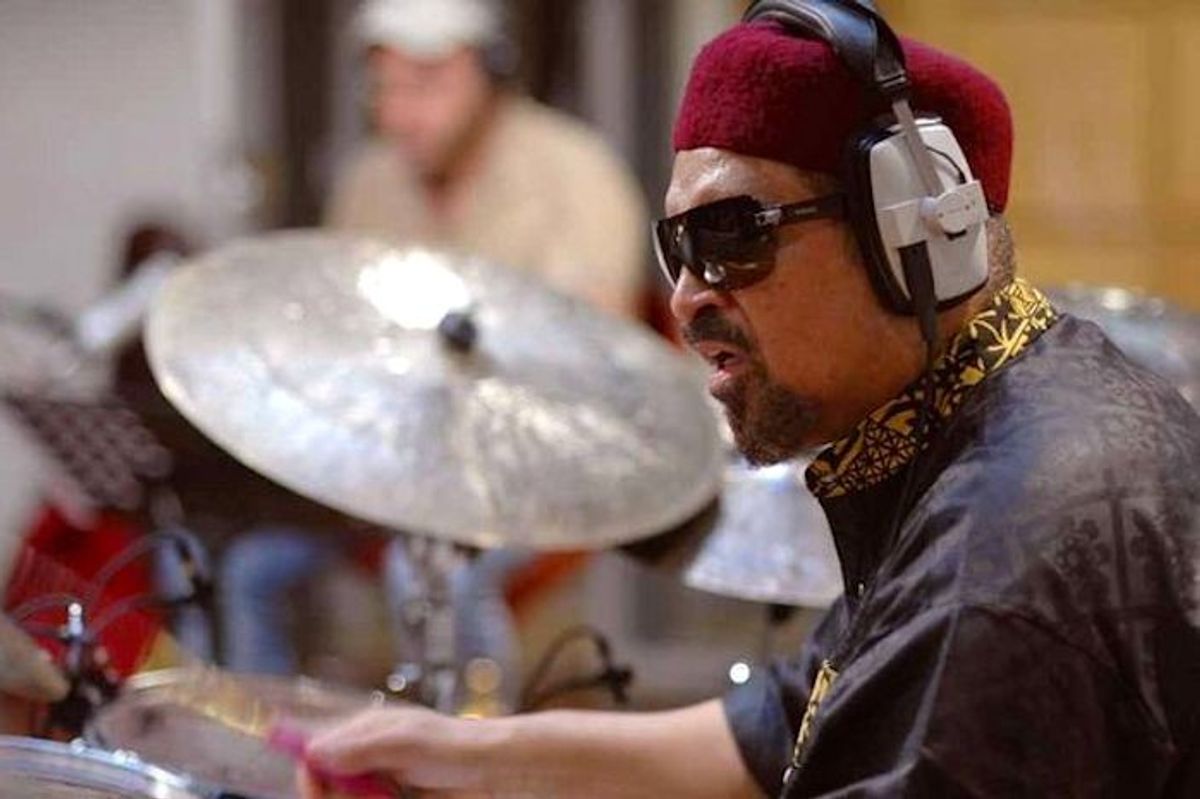
Legendary Jazz & Funk Drummer Idris Muhammad Dies At The Age Of 74.

Legendary jazz and funk drummer Idris Muhammad has died at the age of 74. Muhammad's friend and founder of the Jazz Journey concert series, Dan Williams, confirmed the drummer's death on July 29th, according to the New Orleans Times-Picayune. Muhammad's passing follows his return to the city of his birth in 2011, where he retired after residing for years in New York City and Europe. Upon his return to the city, Muhammad penned and published his 2012 memoir Inside The Music: The Life of Idris Muhammad with friend and fellow drummer Britt Alexander. Idris Mhammad was reportedly buried immediately following his death in accordance with the traditions of his Islamic faith.
Born Leo Morris in New Orleans, Louisiana on November 13, 1939, Idris Muhammad spent his early days hanging with Aaron Neville and first made a name for himself at the age of 16 as the drummer on Fats Domino's "Blueberry Hill." He later played with the Hawketts on the famed "Mardi Gras Mambo." He scored his first touring gig with Sam Cooke. Muhammad would go on to play and record with a host of artists including frequent collaborator Ahmad Jamal, Gene Ammons, Pharoah Sanders, Grant Green, Lou Donaldson, Hank Crawford, Houston Person, Curtis Mayfield, Jerry Butler, Roberta Flack and Grover Washington Jr.
Muhammad released a number of notable projects over more than three decades of recording as a leader between 1970 and 1998, including projects for the famed labels Kudu and Prestige. Some of his most recognized works include Power of Soul, Peace and Rhythm, House of the Rising Sun and Black Rhythm Revolution. He recorded a multitude of projects as a highly sought-after side man for artists on Blue Note, CTI, Cadet and Verve amongst other labels. Muhammad's work, like many other greats, also litters the world of hip-hop samples from fills to familiar breaks and grooves. His sound has bolstered the byproducts of plenty of the most celebrated producers and MC's. Muhammad commented on the phenomenon of sampling during an exclusive interview with Wax Poetics:
How do you feel about the appropriation of your music by the hip-hop generation? I think it’s a great music, man; look at the record sales. These guys sell so many records that they only have to have one hit. But how do you feel about the movement artistically? Yeah, I like it, ’cause it’s another phase of the music. Even though hip-hop musicians appropriate your music? And you’re not necessarily getting paid for it? It don’t really belong to me, man; I’m only the creator. If you take something I create, and you do something with it, then someone else will take it and move it to another stage. And this is what happened with hip-hop. This is in my aura. I’m doing stuff for people to put out there so people can grab it. The gift the Creator has given me, I can’t be selfish with. If I keep it in my pocket, it’s not going to go anyplace. It doesn’t matter if a guy stole from me. I’d say, “Well, what did you do? Okay, let me show you this.” This is how I live.
Idris Muhammad's charm as a master percussionist has been attributed to his natural talent and the precise tuning of his drum kit, which captured the essence of the New Orleans second line sound. Writer Keith Spera described the very precise magic of Muhammad's approach and how the omnipresent sonic heritage of the Mardi Gras tradition manifest in the drummer's life just ahead of his ultimate return to the Crescent City, in a 2010 piece for the Times-Picayune:
"Leo Morris was mesmerized by the chants and rhythms of the Mardi Gras Indians. Years later, he moved to New York and then Europe, changed his name to Idris Muhammad and deployed those rhythms as a prolific drummer for hire. Over five decades, he logged hundreds of recordings and thousands of performances with Sam Cooke, Jerry Butler, Roberta Flack, avant-jazz saxophonist Pharoah Sanders, jazz funk saxophonist Lou Donaldson, guitarist Melvin Sparks, pianist Ahmad Jamal, New York tenor star Joe Lovano and many more. In recent years, Muhammad has returned to his hometown to mask Indian with saxophonist Big Chief Donald Harrison's tribe."
WWOZ 90.7 FM's George Ingmire recently described Muhammad's contributions in light of his passing, which reportedly devastated the staff of the station:
"I'd put him on the Mount Rushmore of New Orleans drummers, along with Smokey Johnson, Johnny Vidacovich and Herlin Riley," said George Ingmire, host of Wednesday's "New Orleans Music Show" and the nationally syndicated radio show "New Orleans Calling." As soon as he had set up his Mount Rushmore, of course, Ingmire, who didn't know Muhammad personally, started thinking of others worth including, such as Zigaboo Modeliste and Ed Blackwell. But Muhammad, he said, was special: "It was his the soulfulness that he brought to the funkiness of the music. He opened it up a little more by drumming in a soulful way. He played with a lot of people, and made their music sound better."
Though the loss of yet another great is a massive blow to the music world at large, Muhammad's catalog, groundbreaking versatility and lasting impact as a pillar of the New Orleans musical tradition will ensure his work and style are celebrated across genres for decades to come. We would like to thank Idris Muhammad for the rhythm and wish him nothing but abundant peace.